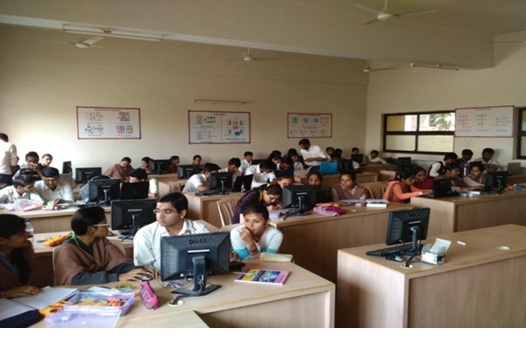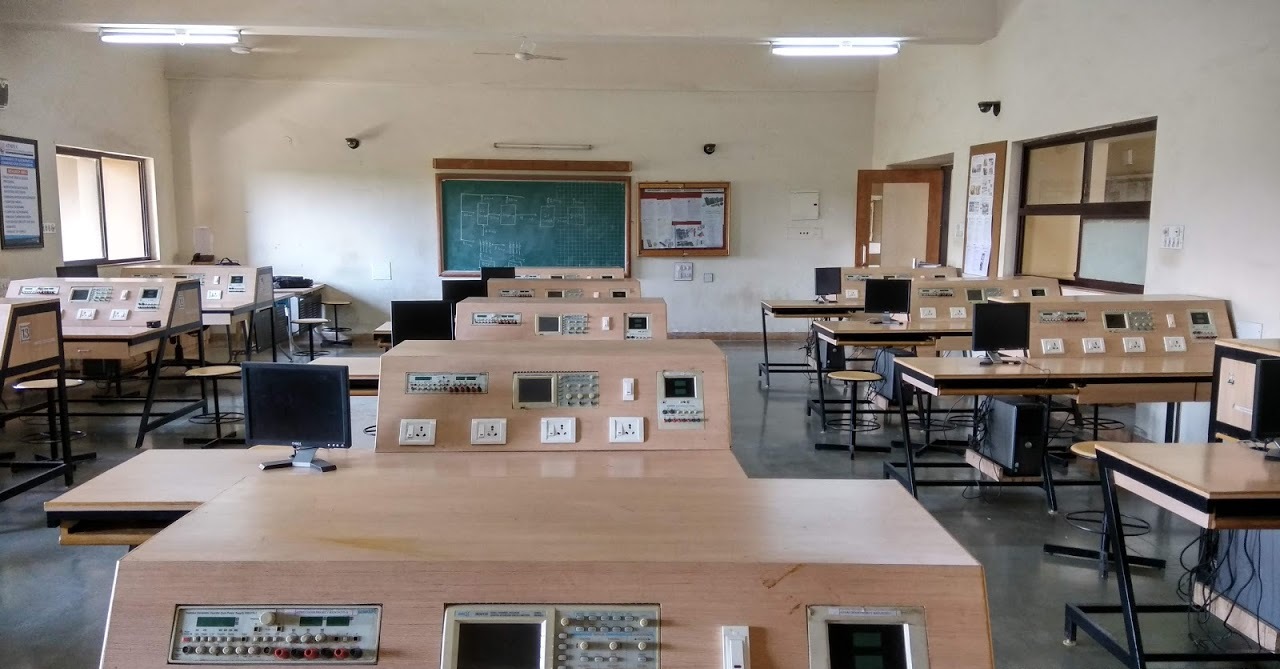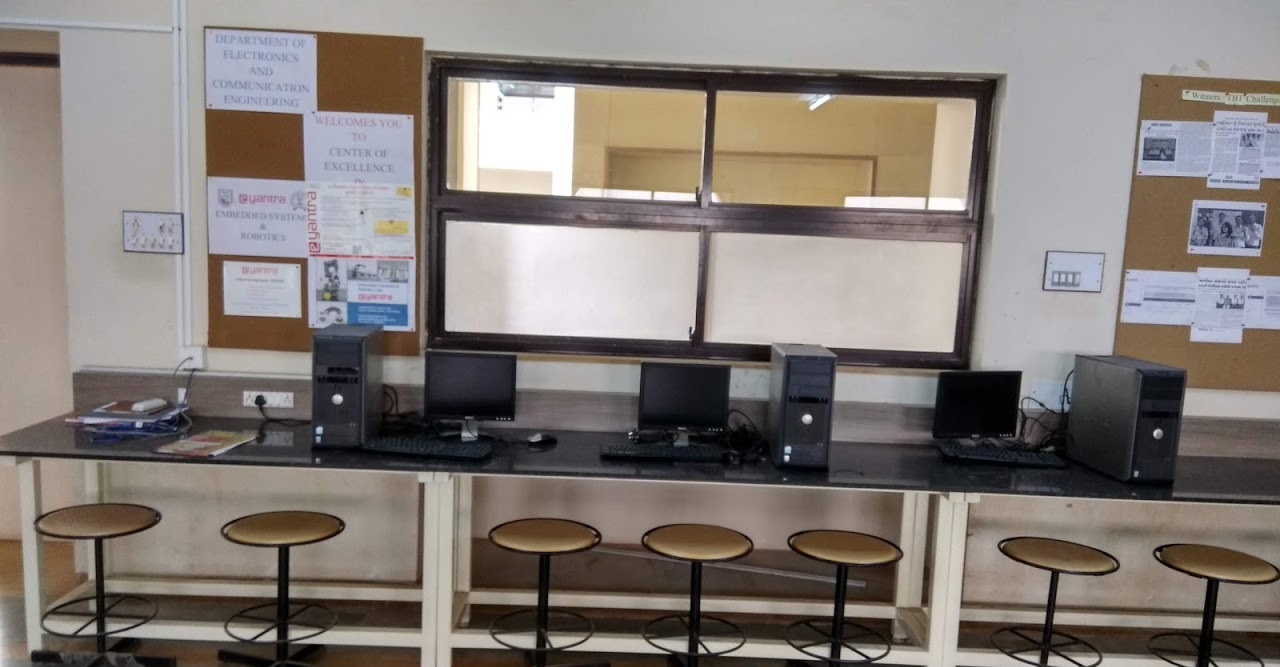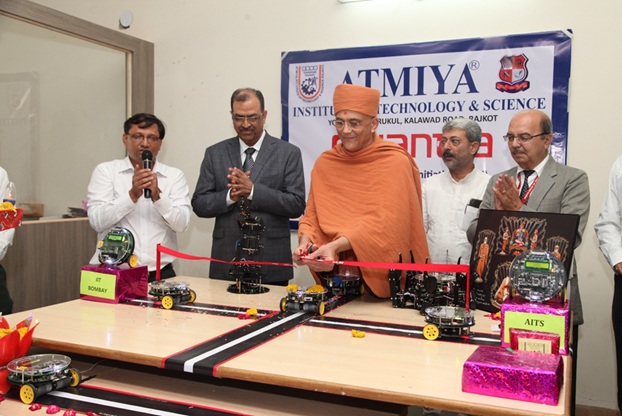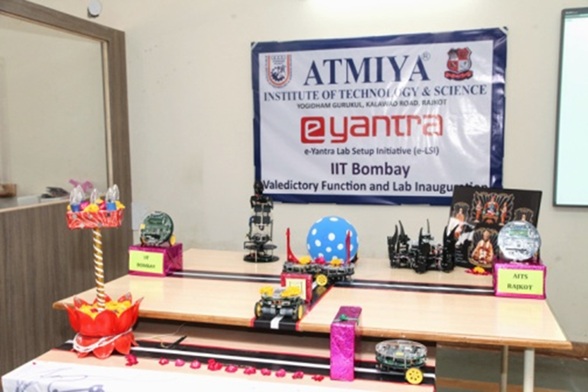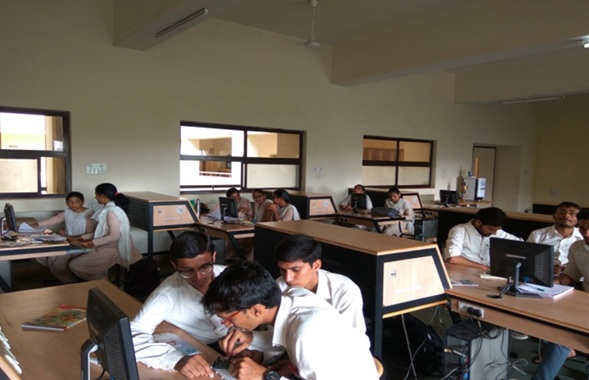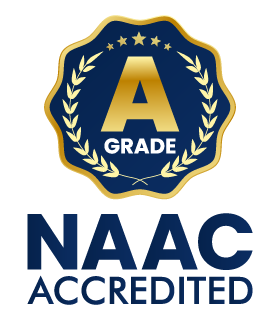About Department
Vision & Mission
Objectives
Academic Excellence
To provide a strong foundation in electronics and communication engineering principles through a balanced curriculum and outcome-based education.
Skill Development
To equip students with practical skills and problem-solving abilities through hands-on laboratory experience and project-based learning.
Research and Innovation
To promote research culture and innovation by encouraging students and faculty to engage in cutting-edge research, publications, and collaborative projects.
Industry Readiness
To bridge the gap between academia and industry by offering industry-relevant training, internships, and collaborations with leading organizations.
Ethical and Social Responsibility
To instill professional ethics, environmental consciousness, and a sense of social responsibility in students.
Lifelong Learning
To encourage continuous learning and professional development through higher education, certifications, and participation in technical forums.
Entrepreneurship and Leadership
To foster entrepreneurial thinking and leadership qualities, preparing students to take initiative in startups, R&D, and management roles.
Graduate Attributes
Engineering Knowledge
Apply knowledge of mathematics, science, and engineering fundamentals to solve complex electronics and communication problems.
Problem Analysis
Identify, formulate, research literature, and analyze engineering problems to arrive at substantiated conclusions using first principles.
Design/Development of Solutions
Design system components or processes that meet specified needs with consideration for public health, safety, and environmental concerns.
Conduct Investigations of Complex Problems
Use research-based knowledge and methods including experiments, data analysis, and interpretation to draw valid conclusions.
Modern Tool Usage
Apply appropriate techniques and modern engineering tools to model and analyze complex ECE problems, with an understanding of their limitations.
The Engineer and Society
Apply reasoning to assess societal, health, safety, legal, and cultural issues relevant to engineering practices.
Environment and Sustainability
Understand the impact of engineering solutions in societal and environmental contexts and demonstrate knowledge of sustainable development.
Ethics
Apply ethical principles and commit to professional ethics and responsibilities in engineering practice.
Individual and Team Work
Function effectively as an individual and as a member or leader in diverse teams and multidisciplinary settings.
Communication
Communicate effectively on complex engineering activities with the engineering community and society at large.
Project Management and Finance
Demonstrate knowledge of engineering and management principles to manage projects in multidisciplinary environments.
Lifelong Learning
Recognize the need for, and have the preparation and ability to engage in independent and lifelong learning in the context of technological change.
Program Educational Outcomes
PEO1 – Core Competence
Develop a strong foundation in electronics and communication engineering to solve real-world engineering problems and pursue advanced studies or research.
PEO2 – Professionalism
Demonstrate professional competence through ethical practices, effective communication, teamwork, and leadership in multidisciplinary environments.
PEO3 – Innovation and Lifelong Learning
Engage in lifelong learning through continuous professional development, innovation, and adapting to emerging technologies.
PEO4 – Societal Contribution
Apply engineering knowledge to contribute to societal development through sustainable, inclusive, and ethical solutions.
Program Outcomes
| PO | Program Outcome | Mapped Graduate Attribute |
|---|---|---|
| PO1 | Apply knowledge of mathematics, science, engineering fundamentals, and electronics & communication engineering to solve complex engineering problems. | Engineering Knowledge |
| PO2 | Identify, formulate, and analyze complex engineering problems using principles of basic sciences and engineering sciences. | Problem Analysis |
| PO3 | Design solutions for complex engineering problems and design system components or processes to meet specified needs. | Design/Development of Solutions |
| PO4 | Conduct investigations using research-based knowledge and methods including experiments, analysis, and interpretation. | Conduct Investigations of Complex Problems |
| PO5 | Create, select, and apply appropriate techniques, resources, and modern tools for engineering activities. | Modern Tool Usage |
| PO6 | Assess societal, health, safety, legal, and cultural issues and the consequent responsibilities. | The Engineer and Society |
| PO7 | Understand the impact of engineering solutions in societal and environmental contexts and demonstrate knowledge of sustainable development. | Environment and Sustainability |
| PO8 | Apply ethical principles and commit to professional ethics and responsibilities. | Ethics |
| PO9 | Function effectively as an individual and in teams, including diverse and multidisciplinary settings. | Individual and Team Work |
| PO10 | Communicate effectively on complex engineering activities with peers and society at large. | Communication |
| PO11 | Demonstrate knowledge of engineering and management principles and apply them to project and financial management. | Project Management and Finance |
| PO12 | Recognize the need for lifelong learning and have the ability to engage in it independently. | Lifelong Learning |
Program Specific Outcomes
PSO1 – Circuit Design and Analysis
Design, simulate, and analyze electronic circuits and communication systems using modern tools for applications in signal processing, embedded systems, and VLSI.
PSO2 – Communication and Networking
Apply knowledge of wireless communication, optical communication, and networking to develop effective and secure communication systems.
PSO3 – Embedded and Automation Systems
Design and implement embedded systems and automation solutions using microcontrollers, sensors, and IoT technologies for industrial and societal applications.
Faculty profile





Kalpesh Chudasama
Assistant Professor
Ph.D.(Pursuing),M.E.
Exp:14 Years

Scope
The B.Tech. in Electronics and Communication Engineering (ECE) offers vast and evolving opportunities across diverse technological domains. With its interdisciplinary nature, the branch equips students with the knowledge and skills to excel in both core electronics sectors and emerging digital fields.
Key Career and Industry Opportunities :
- Automation Industries: Opportunities in industrial automation, robotics, and process control systems using PLCs, SCADA, and embedded solutions.
- Communication Fields: Roles in wireless technologies, satellite communication, and digital transmission systems.
- Mobile Service Providers: Core technical and network optimization roles in major telecom companies like IDEA, AIRTEL, Vodafone, Jio, and others.
- Indian Armed Forces: Technical and communication roles in all three wings: Army, Navy, and Air Force, through engineering and technical recruitment channels.
- Multinational IT Companies: Software, system design, testing, and consulting roles in companies like TCS, Infosys, Wipro, Tech Mahindra, and HCL.
- Electronics Design and Manufacturing: Circuit design, PCB development, and product engineering in consumer electronics, automotive electronics, and defense systems.
- Computer Hardware and Software Industries: Design and support of computing systems, hardware integration, and system architecture.
- Public Sector Units (PSUs): Prestigious opportunities in ISRO, DRDO, BHEL, BEL, Prasar Bharti, Indian Railways, and more through GATE and other exams.
- Embedded Systems: Design and development of microcontroller-based systems, IoT devices, and real-time applications in industries like healthcare and automotive.
- Mobile Equipment Manufacturing and Maintenance: Careers in assembly, design, testing, and maintenance of smartphones and telecom hardware.
- Research and Development: Work in advanced research areas such as VLSI, signal processing, AI integration in electronics, and communication protocols.
- Policy-driven Opportunities: Boosted by Government initiatives like Make in India, Digital India, Electronics Policy, and Smart Cities Mission, which have created numerous jobs and entrepreneurship pathways in the ECE domain.
Research and Publication
Dr. Ashish Kothari
Journal Article
Thanki, R., Kothari, A. &Borra, S. (2021) Hybrid, blind and robust image watermarking:RDWT – NSCT based secure approach for telemedicine applications. Multimedia ToolsAppl (2021). https://doi.org/10.1007/s11042-021-11064-y
Raviya, K.H., Vyas, D.V., Kothari, A.M. (2019) “SVD based performance improvementin hiding a message behind an image”, International Journal of Advanced Trends inComputer Science and Engineering Volume 8, Issue 2, March-April 2019, Pages 182-186(Web of Science)
RohitThanki, Ashish Kothari, Deven Trivedi, (2019) “Hybrid and blind watermarkingscheme in DCuT –RDWT domain”, Elsevier: Journal of Information Security andApplications 46 (2019) 231–249 with ISSN: ISSN: 2214-2126 (Web of Science)
Meera D. Doshi ; Prakash P. Gajjar ; Ashish M. Kothari, (2018) “Zoom based imagesuper-resolution using DCT with LBP as characteristic model ” Elsevier: Journal of KingSaud University – Computer and Information Sciences
Conference Proceedings
Vruti S Joshi ; Balvant J Makwana ; Ashish M Kothari, “A Circularly Polarized DualbandPatch Antenna with Branch-line Coupler for IRNSS Application”, 2nd IEEEInternational Conference on Recent Trends in Electronics, Information andCommunication Technology (RTEICT 2017), Venkateshwara College of Engineering,Bangalore, India, 19th May, 2017.
Meera D. Doshi ; Prakash P. Gajjar ; Ashish M. Kothari, “Image Super-Resolution usingDWT based Learning with Zooming Approach”, 5th International Conference on SignalProcessing and Integrated Networks (SPIN 2018), Amity University, Delhi, India, 22nd –23rd February, 2018. Deven N Trivedi ; Nimit Shah ; Ashish M. Kothari, “Dental Extraction & Matching usingContour Algorithm on JPG and DICOM Images for Human Identification”, 2016
International Conference on Signal Processing, Communication, Power and EmbeddedSystem (SCOPES 2016), Paralakhemundi, India, 3rd – 5th October, 2016.Ashish M. Kothari ; Ved Vyas Dwivedi, “Transform Domain Video Watermarking:Design, Implementation and Performance Analysis” , in the International conference onCommunication Systems and Network Technologies (CSNT - 2012) from 11th -13th may,2012 Organized by MIR Labs society at Rajkot, India.https://www.scopus.com/authid/detail.uri?authorId=55253537400
Journal Article
Thanki, R., Borra, S., & Kothari, A. (2021). Fragile Watermarking Framework forTamper Detection of Color Biometric Images. International Journal of Digital Crime andForensics (IJDCF), 13(2), 35-56. http://doi.org/10.4018/IJDCF.2021030103Thanki, R., Kothari, A. (2021) Multi-level security of medical images based onencryption and watermarking for telemedicine applications. Multimed Tools Appl 80,4307–4325 (2021). https://doi.org/10.1007/s11042-020-09941-z
RohitThanki, Ashish Kothari, (2019) “Hybrid domain watermarking technique forcopyright protection of images using speech watermarks”, Springer: Journal of AmbientIntelligence and Humanized Computing, Pg. 1-23, with ISSN: Online: 1868-5145, Print:1868-5137. (SCI-Web of Science)Kaushik Raviya, Ved Vyas Dwivedi, Ashish Kothari, (2019), “A Mixture of DWT-DCTbased Digital Watermarking Algorithm against various Attacks and its Application”,International Journal of Innovative Technology and Exploring Engineering (IJITEE), Pg.796-800, with ISSN: 278-3075, Vol-(8). (Web of Science)
UGC Care Journal Article
Raviya, M. K. H., & Kothari, A. M. (2018). Comparative study of digital imagewatermarking based IJ Cox's algorithm versus proposed hybrid DWT-DCT approach. EurJ Acad Essays, 5(5), 98-104.
Varia, D., Rathod, D., & Kothari, A. M. (2020). Architecture for Air Pollution AwareVehicle Rerouting in Smart Cities Using Machine Learning & Ant Colony Algorithm.Studies in Indian Place Names, 40(9), 5–10.
Nayankumar Patel, Dr. Ashish Kothari, Dr. Ved Vyas Dwivedi (2020), Image QualityAssessment For Various Medical Image Processing Applications, STUDIES IN INDIANPLACE NAMES (UGC CARE JOURNAL), ISSN: 2394-3114, VOL-40-ISSUE-NO.-9 – 2020
Modha, H. J., & Kothari, A. M. (2020). systematic approach for economic use of naturalresources by means of machine learning. Our Heritage Journal, 22(1).
Modha, H. J., & Kothari, A. M. (2021). Crop Diseases Severity Identification by DeepLearning Approach. ADBU Journal of Engineering Technology, 10(1).
Patel, N., Dwivedi, V. V., & Kothari, A (2020). HYBRID DCT-DWT BASED ROIMEDICAL IMAGE COMPRESSION FOR TELEMEDICINE APPLICATION. image,8, 8.
Publications and Presentations - IEEE International Conferences
Ashish M. Kothari ;Ved Vyas Dwivedi, “Performance Analysis of digital watermarkingof Video in the Spatial Domain”, in the 2011 IEEE International Conference onComputational Intelligence and Computing Research (ICCIC2011) from 15th – 18thDecember, 2011 with IEEE Xplore :CFB1120J-ART ISBN:978-1-61284-694-1 PrintVersion:CFB1120J-PRT ISBN:978-1-61284-766-5
Ashish M. Kothari ;Ved Vyas Dwivedi, “Discrete Wavelet Transform Based DigitalVideo Watermarking - A Novel Approach to hide binary watermark behind video”, in the2011 IEEE International Conference on Computational Intelligence and ComputingResearch (ICCIC2011) from 15th – 18th December, 2011 with IEEE Xplore :CFB1120JARTISBN:978-1-61284-694-1 Print Version:CFB1120J-PRT ISBN:978-1-61284-766-5
Ashish M. Kothari ; Ved Vyas Dwivedi, “Transform Domain Video Watermarking:Design, Implementation and Performance Analysis” , in the International conference onCommunication Systems and Network Technologies (CSNT - 2012) from 11th -13th may,2012 Organized by MIR Labs society at Rajkot, India.
Publications - International Journal
Varia, D., & Kothari, A. M. (2021). Analysis of the issue of ant being stuck in the cycleby ant colony system algorithm & solution. Multidisciplinary International ResearchJournal of Gujarat Technological University, 3(1), 9.
Ghedia, Navneet&Vithalani, Chandresh& Kothari, Ashish. (2020). A comprehensiveSurvey: Background Estimation and Motion Detection Approaches. GIS ScienceJournal,Vol.7,Iss 8.Pg. 92-98 DOI:20.18001.GSJ.2020.V7I7.20.35591.
Ghedia, Navneet&Vithalani, Chandresh& Kothari, Ashish. (2020). CriticalComparative Analysis of Object Detection and Tracking Algorithms. AEGAEUMJOURNAL. ISSN NO: 0776-3808 DOI:16.10089.AJ.2020.V8I8.285311.4045 Page No:1404-1409
Ghedia, Navneet&Vithalani, Chandresh& Kothari, Ashish. (2017). Implementation OfForeground Detection Algorithm Using Modified Gmm For Outdoor Surveillance. GISScience Journal,Vol.7,Iss 7.Pg. 634-661 DOI:20.18001.GSJ.2020.V7I7.20.35591
Ghedia, Navneet&Vithalani, Chandresh& Kothari, Ashish. (2017). PerformanceEvaluation of Crowd Analysis Algorithm using Modified GMM and AdaptiveThresholding. Indian Journal of Science and Technology. 10. 1-7.10.17485/ijst/2017/v10i17/111960.
Ghedia, Navneet S., Dr. C. H. Vithalani and Ashish Kothari. “A Novel Approach forMonocular 3 D Object Tracking in Cluttered Environment 853 Monocular VideoSequences.” (2017).
Ghedia, N.S., Vithalani, D.C., & Kothari, D.A. (2017). Critical Performance Analysis ofObject Tracking Algorithm for Indoor Surveillance using modified GMM and KalmanFiltering.
“Performance analysis of Digital Watermarking of Video in the Spatial Domain” in theInternational Journal of Recent Research in Electrical and Electronics Engineering(IJRREEE) in vol.1 issue 1 page no. 18-24 with ISSN 2349- 7815 Year 2015
“Video Watermarking – Embedding Grayscale Messages Using Singular ValueDecomposition” in International Journal of Computer Science Engineering andInformation Technology Research (IJCSEITR) ; ISSN(Print):2249-6831 ; ISSN(Online):2249- 7943; Volume : 3; Issue : 3; Impact Factor(JCC): 6.3925 Year 2013
“Hybridization of DWT & DCT – A Novel approach to embed message behind video”, inInternational Journal Of Darshan Institute on Engineering Research & EmergingTechnologies, Volume 1, Number 1, 2013, Page no. 42 - 47 with Print: ISSN: 2320-7590
“Video Watermarking – Combination of Discrete Wavelet & Cosine Transform toachieve Extra Robustness” in the International Journal of Image, Graphics and SignalProcessing (IJIGSP), Volume 5 Number 3, 2013, Page no. 36 - 41 with Print: ISSN 2074-9074 & Online: ISSN 2074-9082.9 | P a g e
“Video Watermarking – Implementation and Performance Analysis of Combined DWT –SVD Approach”, in the STM journals - Current Trends in Signal Processing, Volume 2,Issue 3, December 2012, page no. 23 – 31 with online: ISSN 2277-6176.
“Hybridization of DCT and SVD in the Implementation and Performance Analysis ofVideo Watermarking”, in International Journal of Image, Graphics and Signal Processing(IJIGSP), Volume 4 Number 5, 2012, Page no. 14 - 20 with Print: ISSN 2074-9074 &Online: ISSN 2074-9082.
“Spatial Domain Video Watermarking-A Correlation based approach” in the CiiTInternational Journal of Digital Image Processing (Impact Factor: - 0.652) with Print:ISSN 0974 – 9691 & Online: ISSN 0974 – 9586 (March – 2012 Issue).
“Performance Analysis of Digital Video Watermarking using Discrete CosineTransform”, in the International journal of Electrical & Computer Engineering systems(IJECES), ISSN: 1847-7003 ,Volume 2, Number 1, 2011, page no. 11 – 16.
“Performance Analysis of Digital Image Watermarking Technique – Combined DWTDCTover individual DWT” in the international journal of Advanced Engineering andApplications with Print ISSN: 0975 7783 and Online ISSN: 0975 7791(January 2010Issue).
“Advanced Motion Estimation Algorithm for H.263+” in the international journal ofAdvanced Engineering and Applications with Print ISSN: 0975 7783 and Online ISSN:0975 7791(June 2010 Issue).
Hardik Raval, Ashish Kothari (2014), Analysis of Single Frame Super ResolutionMethods, International Journal Of Engineering And Computer Science ISSN:2319-7242Volume 3 Issue 11 November, 2014 Page No. 9073-9076
Mr. Kapil S. Raviya, Dr. Ashish M. Kothari, Dr. DwivediVed Vyas (2014), Depth andDisparity Extraction Structure for Multi View Images Video Frame-A Review, EuropeanJournal of Academic Essays, ISSN(online): 2183-1904; ISSN(online): 2183-3818
Dhavalsinh V Solanki, Dr. Ashish Kothari (2015), Comparative Survey of FaceRecognition Techniques, International Journal of Advance Engineering and ResearchDevelopment (IJAERD) e-ISSN: 2348 - 4470 , print-ISSN:2348-6406,ImpactFactor:3.134
Dimpee Chandarana, Dr. Ashish Kothari (2015), Brain Tumour Segmentation Methods:A Review, International Journal of Advance Engineering and Research Development(IJAERD) e-ISSN: 2348 - 4470 , print-ISSN:2348-6406,Impact Factor:3.134
M. R. Kotecha, Dr. A. M. Kothari (2015), Performance Enhancement of imagecompression using SVD and Arithmetic Coding, International Journal of AdvanceResearch in Computer Science and Management Studies, Volume 3, Issue 10, ISSN:2321-7782 (Online)
K. D. Thakar, Dr. A. M. Kothari (2015), A Review Paper on Performance Improvementof Image Mosaicing using Super Resolution Technique, International Journal of AdvanceResearch in Computer Science and Management Studies, Volume 3, Issue 10, ISSN:2321-7782 (Online)
Kapil S. Raviya, DwivediVed Vyas, Ashish M. Kothari (2016), An Evaluation andImproved Matching Cost of Stereo Matching Method, I.J. Image, Graphics and SignalProcessing, 2016, 10, 42-52
KapilRaviya, Ved Vyas Dwivedi, Ashish Kothari and GunvantsinhGohil (2019), RealTime Depth Hole Filling using Kinect Sensor and Depth Extract from Stereo Images,Oriental Journal of Computer Science and Technology, ISSN: 0974-6471, Vol. 12, No.(3) 2019, Pg. 115-122
Publication and Presentations - International Conferences “Digital Watermarking: Practical Implementation Using Discrete Wavelet Transform”in International Conference on Signal, System and Automation (ICSSA-2009) Organizedby Department of Electronics & Communication Engineering, G.H.Patel College ofEngineering & Technology, V.V.Nagar from 28th to 29th December, 2009
“Human Tracking in surveillance applications using MATLAB” in the internationalconference on Innovative Technologies (ICIT – 2009) organized by PDM college ofEngineering in collaboration with IEEE-IMS/EMBS (Delhi) from 18th to 19th june, 2009.
“Spatial Image Watermarking – Very easy approach to hide one image behind otherimage”, in the international conference on Science, Engineering and Spiritualityorganized by SES College of Engineering on 1st and 2nd April, 2010
Performance analysis of Spatial and frequency domain based digital ImageWatermarking – a road towards video watermarking” , presented and published in theInternational conference of Innovative Science and Technology organized by V.V.P.Engineering College Rajkot on 8th-9th April, 2011(ISBN:978-81-906377-5-6).
“Enhancement of Time Lapse Video Technique using visible and invisible watermarking” in international conference on Research, Development in Engineering, Technology andSciences 2013 held on 7th April, 2013
“A new Hybrid concept of DCT and DWT for Medical Image Compression” presented inthe international conference on Information and Communication Technology forCompetitive Strategies (ICTCS-2014) held on 14th – 16th November 2014.
Publication and Presentations - National Conferences
“Digital Image Processing – A case Study motion detector using MATLAB,” in Nationalconference on Advances in Electronics system Design on 21st November, 2008 organizedby Department of Electronics & Communication, Atmiya Institute of Technology &Science, Rajkot on 21st November, 2008.
“A Case Study-Attendance System using Radio Frequency Identification,” in NationalConference on Emerging Trends in Information Communication Technologies(NCERICT) Organized by C. U. Shah College of Engineering & Technology, Wadhwanon 19th April, 2009.
“Digital Watermarking, Technique to Embed visible and invisible watermark”, in thenational conference on Wireless Communication & VLSI Design, organized byDepartment of Electronics & Communication, Gwalior Engineering College, Gwalior on27th and 28th March, 2010.
“Analytical approach of Robust Singular Value Decomposition based videowatermarking”, in the 1stNational Conference On Innovative & Emerging Technologies(NCIET-2013) organized by Smt S. R. Patel College Of Engineering, Unjha on 24th –25th January 2013 with ISBN 978-81-925650-0-2.
Patents
Self
Patent on “Digital Video Watermarking using triple transform” with patentregistration number 3545/MUM/2012.
As Guide
Patent on “Laser Pointer Interaction To Control Projector Screen Using ImageProcessing” with patent registration number 1540/MUM/2013.
Patent on “Speech Recognition System with Adaptable Speaker and Command”with patent registration number 1539/MUM/2013.
Patent on “Sign Converter” with patent registration number 1538/MUM/2013.
Patent on “Human Intelligent System” with patent registration number1535/MUM/2013.
Patent on “Mobility Assistant for Disabled Person” dated 21/04/2014 withapplication number 1419/MUM/2014.
Patent on “Emergency Charger for Mobile Devices” dated 4/6/2014 with applicationnumber 1843/MUM/2014.
Patent on “Performance Improvement of Voting System in India by UsingAutomization of Microcontroller and Image Processing” dated 13/10/2014 withapplication number 3241/MUM/2014 (Published)
Patent on “IANTS An invisible antitheft security door lock system – Mobileoperated door lock” with application number 3831/MUM/2014.
Patent on “Walking with Charging Shoes” with application number2706/MUM/2015.
Patent on “Automatic Solar Panel Cleaning” with application number 201621037459.
Books/Book Chapter/Article Published
Books with Springer International Publishing
“Hybrid and Advanced Compression Techniques for Medical Images”, in 2019 withSpringer International Publishing and ISBN 978-3-030-12574-5 and 978-3-030-12574-5(eBook) – Scopus Indexed
“Dental Image Processing for Human Identification” in February 2019 with SpringerInternational Publishing and ISBN 978-3-319-99470-3 and 978-3-319-99471-0(eBook)
“Watermarking Techniques for Copyright Protection of Videos” in August 2018with Springer International Publishing and ISBN 978-3-319-92837-1(eBook) & 978-3-319-92836-4 (Hardcover) – Scopus Indexed
“Digital Image Processing using SCILAB” in May 2018 with Springer InternationalPublishing and ISBN 978-3-319-89533-8 (eBook) & 978-3-319-89532-1 (Hardcover)– Scopus Indexed
“Moving Objects Detection Using Machine Learning”, in Jan 2022 SpringerBriefs inElectrical and Computer Engineering. Springer, Cham. https://doi.org/10.1007/978-3-030-90910-9_5
Other International Books
“Real Time Analysis of Digital Watermarking Techniques – FundamentalIntroduction and MATLAB based implementation of Image Watermarking” in 2011with LAMBERT Academic Publishing, Germany and ISBN: 978-3-8465-0378-2
“Laser Guided Missile System, Microcontroller and Digital Image Processing” inFebruary 2012 with LAMBERT Academic Publishing, Germany and ISBN: 978-3-8484-0307-3
“Robotics, Modern Day Application” in March 2012 with LAMBERT AcademicPublishing, Germany and ISBN: 978-3-8484-2404-7
Book Chapters
Thanki, R. M., & Kothari, A. M. (2017). Digital Watermarking: Technical Art of Hidinga Message. In S. Bhattacharyya, H. Bhaumik, S. De, & G. Klepac (Ed.), IntelligentAnalysis of Multimedia Information (pp. 431-466). IGI Global. http://doi:10.4018/978-1-5225-0498-6.ch016 – Scopus Indexed
Patel N.R., Kothari A. (2016) Performance Analysis of Medical Image CompressionTechniques. In: Satapathy S., Joshi A., Modi N., Pathak N. (eds) Proceedings ofInternational Conference on ICT for Sustainable Development. Advances in IntelligentSystems and Computing, vol 408. Springer, Singapore. https://doi.org/10.1007/978-981-10-0129-1_54 (Springer Publication)
Thanki R., Kothari A. (2020) Security Analysis of Visual Transformation Based ImageEncryption Using Compressive Sensing. In: Mehta A., Rawat A., Chauhan P. (eds)Recent Advances in Communication Infrastructure. Lecture Notes in ElectricalEngineering, vol 618. Springer, Singapore. https://doi.org/10.1007/978-981-15-0974-2_8
Dr. Vishal Vora
International (Published/Presented)
Paper Entitle as “Preserving authenticity: transfer learning methods for detecting and verifying facial image manipulation” is Published in Scopus Indexed Vietnam Journal of Science and Technology, Vol 62, Pages 562-576, having DOI: 10.15625/2525-2518/18626 in June, 2024.
Paper Entitle as “Transfer Learning Based Fine-Tuned Novel Approach for Detecting Facial Retouching” is Published in Scopus Indexed Iraqi Journal for Electrical and Electronic Engineering, Pages 84-94, having DOI: 10.37917/ijeee.20.1.9 in August, 2023.
Paper Entitle as “A comparative study on image forgery-facial retouching” is Published in Scopus Indexed International Journal entitle as Bulletin of Electrical Engineering and Informatics, Vol. 12, Issue-2, Pages 851-859, having ISSN: 2302-9285 in April, 2023.
Paper Entitle as “Efficacy of Decentralized CSS clustering model over TWDP fading Scenario” is Published in Scopus Indexed International Journal on Recent and Innovation Trends in Computing and Communication, Vol. 20, Issue-3, Pages 1039-1045, having ISSN: 2321-8169 (Online) in March, 2023.
Paper Entitled as “Reliable and Scalable Broadcast Scheme for Safety Applications in Vehicular Ad Hoc Network”is Publishedin Scopus Indexed International Journal of Computer Networks and Applications, Vol. 9, Issue-6, Pages 775-784, having ISSN: 2395-0455 in December, 2022.
Paper Entitled as “Performance Evaluation of DCSS using Two Level 1-Bit Hard Decision Strategies over TWDP Fading Channel”is Published in Scopus Indexed International Journal of Electrical and Electronics Research (IJEER), Vol. 10, Issue-4, Pages 1064-1070, having e-ISSN: 2347-470X in November, 2022.
Paper Entitle as “Reliable and Efficient message dissemination by adaptive relay selection in vehicular networks” is Published in UGC Care listed, Web of Science indexed Journal International Journal of Next-Generation Computing, Vol. 13, Issue-3, Pages 485-98, having Print ISSN 2229-4678 & Online ISSN 0976-5034 in October, 2022.
Paper Entitled as “Information Dissemination strategies for safety applications in VANET- A Review” at the 5th International Conference on Intelligent Sustainable Systems organized by SCAD College of Engineering & Technology on 17th&18th February, 2022 at Tirunelveli, India. (Springer Proceedings).
Paper Entitled as “Concise examination of Spectrum sensing Techniques in Cognitive Radio - Issues and Challenges”, Presented in m IETE National Conference on Emerging Technologies in Intelligent Electronic System Design organized by M.A.N.I.T., Bhopal during 18-19th September, 2021.
Paper Entitled as “A Comparative study of different system on chip buses based on industry standards: AMBA, Core connect & wishbone”, is Published in International Journal for scientific research & development, Vol. 1, Issue-11, Feb 2020, having ISSN (online)2321-0613.
Paper Entitled as “Design & Implementation of Real Time Scheduling algorithms for applications in embedded system” Presented in 3rdInternational conference on recent trends in engineering & Technology in 28-30th March-2019 &Published in Proceeding of Elsevier Science and Technology.
Paper Entitled as “Implementation of data transfer operation for multilayer AHB Bus matrix” Published in International Journal of Emerging Technologies and applications in engineering technology & sciences, having ISSN: 0974-3588 in January2018.
Paper Entitled as “A Comparative study of different system on chip buses based on industry standards: AMBA, Core connect and wishbone” Published in International journal for scientific research & development, having ISSN (online): 2321-0613 in May 2019.
Paper Entitled as “Design control unit & ROM unit of low power FFT Processor for OFDM System”, Published in International Journal of Emerging Trends in Electrical and Electronics (IJETEE) inApril-2013.
Paper Entitled as “Remotely Secured Device Access using GSM”, Published in International Journal of Global Research Analysis, having ISSN 2277-8160, in vol.2 issue 4, April2013.
Paper Entitled as “Design incrementing burst data transfer operation for AMBA- Advanced high performance bus”, Published in International Journal of Emerging Trends in Electrical and Electronics (IJETEE) inApril-2013.
Paper Entitled as “Advertising Display System using LED and Graphical LCD” Published in International Journal for Scientific Research & Development, Vol. 1, Issue 2, May- 2013, having ISSN (Online):2321-0613.
Paper Entitled as “Real Time Monitoring & Control System for Industry” Published in International Journal for Scientific Research & Development, Vol. 1, Issue 2, May- 2013, having ISSN (Online):2321-0613.
Paper Entitled as “A reformed cluster head of leach protocol and performance analysis with conventional routing protocol for WSN” Presented in International Conference on Research & Development in Engineering, Technology & Sciences at G.K. Bharad Institute of Engineering, Tramba, Rajkot on 7th April, 2013 &Published in AES Journals in Engineering Technology Sciences &Management.
Paper Entitled as “Implementation & Performance analysis of Rehabilitated Cyclic Scheduling Algorithm for Real Time Systems using TORSCHE & True Time Kernel” Published in International Journal entitled as “Research & Review: A journal of Embedded System and applications” in March 2013.
Paper Entitled as “Design of Real Time Scheduling algorithms for efficient mass production in various industrial applications” Published in International Journal of Darshan Institute of Engineering research & Emerging Technologies in Vol.1, No.1 in March 2013, having ISSN No2320-7590.
Paper Entitled as “An Advanced Approach for Implementation of Real Time Scheduling Algorithm for Efficient Mass Production” Presented in International Conference on Intelligent Systems and Signal Processing at GCET, Vallabh Vidhyanagar on 1-2 March, 2013 & Published in IEEE Xplore Digital Library.
Paper Entitled as “Performance analysis of augmented energy efficient Routing Protocol (LEACH) for utilization in wireless network using NS2” Published in International Journal of Computer and Electronics Engineering Volume 4 Number, pp 280-283 having ISSN: 0975-4202 inDecember-2012.
Paper Entitled “Implementation & Performance analysis of real time scheduling algorithms for three industrial embedded applications (IEA)” Published in International Journal of Information Technology Convergence and Services (IJITCS) Vol.2, No.6, December 2012, having ISSN 2231-153X (Online) & 2231 - 1939 (Print).
Paper Entitled “Smart Multiprocessor Environment Handling using novel real time scheduling algorithm” Published in International Journal of Electronics, Electrical & Communication Engineering in the issue of December-2012, having ISSN0975-4814.
Paper Entitled “Augmentation of RMS Algorithm for embedded multimedia applications” Published in International Journal of Advanced Engineering Research and Studies in the issue of September-2012 issue, having E-ISSN2249-8974.
Paper Entitled “Implementation & Performance analysis of real time kernel for design of distributed control network using True Time Simulator ” Published in International Journal of Engineering Research & Technology” in the issue of August- 2012, having ISSN2278-0181.
Paper Entitled “ Smart Embedded Real Time System Applications using optimized EDF Scheduling Algorithm” Published in International Journal of Information and Computing Technology” in the issue of November-2011, having ISSN0976-5999.
Paper Entitled “Novel Real Time Scheduling Algorithm for Embedded Multimedia Applications” Published in International Journal of Advances in science and Technology, Vol. 3, No. 3, October 2011 with pages from 69 to 74, having ISSN 2229- 5216.
Paper Entitled “Performance Analysis of Fast Motion Estimation Algorithm for H.264/MPEG-4AVC”-PublishedinInternationalJournalofEmergingTechnologiesand applications in Engineering Technology & Sciences in Julyl-2010 Issue having paper ID 983.
Paper Entitled “Analysis of Compressed Image Quality Assessments”- Published in International Journal of Advanced Engineering & Applications in January-2010, Vol. II, and pp.225-229.
Paper Entitled “Security of digital Images from Geometric Attacks”- Presented in International Conference on Signals, Systems & Automation during 28-29 December- 2009 at GCET.
Paper Entitled “Computer Vision in an Embedded System” – Presented & Published in International Conference on Wireless Networks & Embedded System during 23-24 October-2009 at Punjab and pp.35-38.
Paper Entitled “Implementation of Real Time Scheduling in MATLAB – Presented & Published in International Conference on Wireless Networks & Embedded System during 23-24 October-2009 at Punjab and pp.69-74.
Paper Entitled “Implementation of Image Compression Algorithm on MATLAB” –Published in International Journal of Computer applications in Engineering, Technology & Sciences in September -09, Vol. I, Issue-2 and pp.292-294.
Paper Entitled “Vision Algorithm for smart cameras and computer vision based on Embedded System” - Published in International Journal of Computer applications in Engineering, Technology & Sciences in September -09, Vol. I, Issue-2 and pp.660-664.
National (Published/Presented)
Paper Entitled as “Mobile operated Car Cooling System”, Published in Journal of Microprocessor Engineering & applications, Volume 1, Issue 1, in January2014.
Paper Entitled as “Video Streaming using Raspberry Pi”, Published in Journal of Multimedia Technology & Recent Advancements”, STM Journals, having ISSN: 2349- 9028 in December2014.
Paper Entitled as “GSM Based Complete Advertising Display & Control System” Presented & Published in all India conference on Global Innovations in Electronics & Automation, during April 12th-13th, 2013 at chhatrapati Shivaji Institute of Technology, Shivaji Nagar, Durg, India, having ISBN –978-81-923288-1-2.
Paper Entitled as “Wireless Monitoring & Control System” Presented & Published in All India conference on Global Innovations in Electronics & Automation, during April 12th-13th, 2013 at chhatrapati Shivaji Institute of Technology, Shivaji Nagar, Durg, India, having ISBN –978-81-923288-1-2.
Paper Entitled as “A Novel approach for adjustment of CH in energy efficient routing protocol (LEACH) for wireless sensor network”, Published in Journal of Network security, STM Journals in January2013.
Paper Entitled “Implementation of Real Time Scheduling in MATLAB”- Presented & Published in Emerging Trends in Information Communication Technologies on 19thApril-2009 at CCET.
Paper Entitled “A Case Study-Image Processing using MATLAB/IRIS Recognition System”- Published in Emerging Trends in Information Communication Technologies on 19th April-2009 at CCET.
Paper Entitled “A Case Study – Attendance System using Radio Frequency Identification” - Published in Emerging Trends in Information Communication Technologies on 19thApril-2009 at CCET
Paper Entitled “Remote triggering based Embedded Server for Smart Home Environment” - Presented & Published in Atmiya National Conference Cluster during 20-23october-2009
Mr. Yagnesh Makawana
| Computer Vision in an Embedded System | International conference on Wireless networks and Embedded Systems |
| Image Registration using Intensity based Technique | International conference on Research & Development in Engineering, Technology & Sciences |
| A Case Study - Image processing using Matlabirish recognition system | National Conference on Emerging Trends in Information Communication Technologies(NCERICT) |
| A novel Technique for Robust Image Registration using log polar transform | International conference on Communication Systems and Network Technologies (CSNT - 2012) |
| Advanced Motion Estimation Algorithm for H.263+ | International journal of Advanced Engineering and Applications |
| Performance Analysis of Fast Motion Estimation Algorithm for H.264/MPEG-4 AVC | International Journal of Computer Application in Engineering, Technology and Sciences |
| Analysis of compressed Image Quality Assessments | International journal of Advanced Engineering and Applications |
Seema Vora
| INTERNATIONAL JOURNAL OF COMPUTER APPLICATIONS | Peer Reviewed | Yes | International | Yes | CO2 MONITORING SYSTEM ROM REMOTE LOCATION USING GSM,GPS AND CONCEPT OF MODBUS | First / Main Author | 2012 |
| INTERNATIONAL JOURNAL OF ADVANCED RESEARCH IN ENGINEERING AND TECHNOLOGY (LJARET) | Peer Reviewed | Yes | International | Yes | GSM BASED REMOTE MONITORING OF WASTE GAS AT LOCALLY MONITORED GUI WITH THE IMPLEMENTATION OF MODBUS PROTOCOL AND LOCATION IDENTIFICATION THROUGH GPS | First / Main Author | 2012 |
| CiiT International Journal of Wireless Communication | Peer Reviewed | Yes | International | Yes | Remote GAS Plant Monitoring System Using concept of GSM and with Location Identification using GPS Technology | First / Main Author | 2012 |
| International Journal of Scientific Engineering and Technology pg:05-10 | Peer Reviewed | Yes | International | Yes | WIRELESS ENERGY TRANSFER | First / Main Author | Dec.2011 |
Event
| Sr. No. | Event Name | Event Date | Photo Gallery |
|---|
Department Infrastructure
